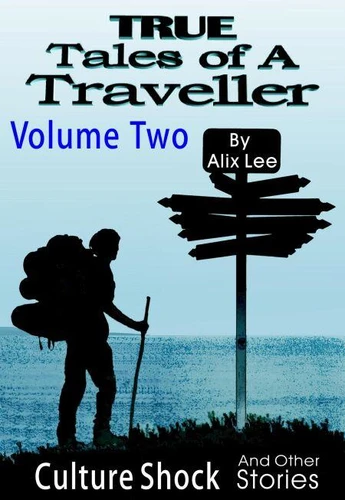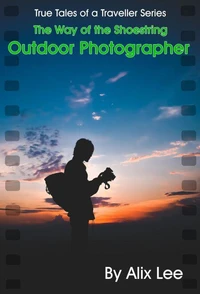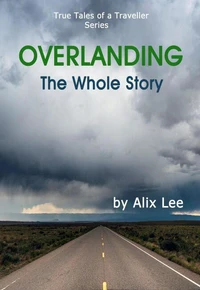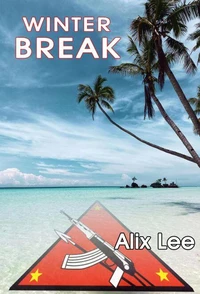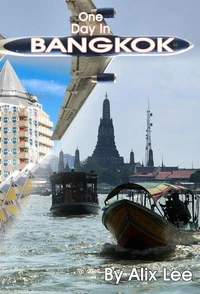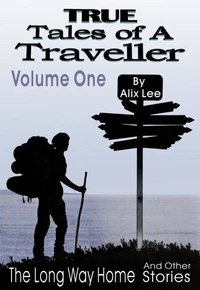Nouveauté
True Tales of a Traveller Volume Two
Par :Formats :
Disponible dans votre compte client Decitre ou Furet du Nord dès validation de votre commande. Le format ePub est :
- Compatible avec une lecture sur My Vivlio (smartphone, tablette, ordinateur)
- Compatible avec une lecture sur liseuses Vivlio
- Pour les liseuses autres que Vivlio, vous devez utiliser le logiciel Adobe Digital Edition. Non compatible avec la lecture sur les liseuses Kindle, Remarkable et Sony
 , qui est-ce ?
, qui est-ce ?Notre partenaire de plateforme de lecture numérique où vous retrouverez l'ensemble de vos ebooks gratuitement
Pour en savoir plus sur nos ebooks, consultez notre aide en ligne ici
- FormatePub
- ISBN8230378280
- EAN9798230378280
- Date de parution14/08/2025
- Protection num.pas de protection
- Infos supplémentairesepub
- ÉditeurIndependently Published
Résumé
This book, Volume Two of the True Tales of a Traveller series, consists of three travel stories; two substantial novella-length stories separated by a story of short story length. These stories can read separately, but the best way to read them is to start with the first. That principle applies to the whole series, and also to this volume. It isn't necessary, however, to read all the stories of Volume One to enjoy those related in Volume Two.
The book begins in late 1984 with the sixth tale in the series overall, Culture Shock. This story finds the young traveller (myself) taken from the relative orderliness of a life in London where he had been attempting, with mixed results, to pursue a career in travel (related in the fifth story of the series, A Career in Travel), and throws him into the furious assault on the senses that constituted life in the Indian capital, Delhi, at that time.
His attempt to integrate his love for travel into a regular, settled lifestyle in London had already begun to unravel even before he left the UK. After only a couple of weeks in India, his career as a travel industry employee has slipped into the past, replaced by an even more vivid and overpowering version of his pre-existing career as a full-time traveller. The second story of this volume, Just A Businessman is set in India-administered Kashmir.
At nearly 17, 000 words, this account constitutes a lengthy short story which may need more than one sitting to read. In addition to being a travel story, Just A Businessman is also a story about religious and ethnic conflict and political upheavals, and the extents to which these can affect the life of a traveller, or an outsider. Overlanding (Part One) is the third story in this volume, and at over 46, 000 words the longest story of the series so far, for one of the shortest periods of actual travel.
Of all my travels in the 1980s, in terms of time spent, undoubtedly no journey made such a deep and lasting impression on me as this overland trip from Karachi to Rotterdam. Not only did it unceremoniously blow away many of my own preconceived notions of life in Pakistan and Iran, it was also a harsh lesson for me as a traveller in the virtues of being prepared for any journey into terra incognita.
Additionally, the first part of the journey, from Karachi to the Turkish border with Iran, was relatively dangerous, not due to involving difficult terrain, but rather to man-made hazards. But overall, the journey turned out to be something I originally had never suspected for a moment it would be: an intensive course in the follies of racial prejudice and ethnic chauvinism.
The book begins in late 1984 with the sixth tale in the series overall, Culture Shock. This story finds the young traveller (myself) taken from the relative orderliness of a life in London where he had been attempting, with mixed results, to pursue a career in travel (related in the fifth story of the series, A Career in Travel), and throws him into the furious assault on the senses that constituted life in the Indian capital, Delhi, at that time.
His attempt to integrate his love for travel into a regular, settled lifestyle in London had already begun to unravel even before he left the UK. After only a couple of weeks in India, his career as a travel industry employee has slipped into the past, replaced by an even more vivid and overpowering version of his pre-existing career as a full-time traveller. The second story of this volume, Just A Businessman is set in India-administered Kashmir.
At nearly 17, 000 words, this account constitutes a lengthy short story which may need more than one sitting to read. In addition to being a travel story, Just A Businessman is also a story about religious and ethnic conflict and political upheavals, and the extents to which these can affect the life of a traveller, or an outsider. Overlanding (Part One) is the third story in this volume, and at over 46, 000 words the longest story of the series so far, for one of the shortest periods of actual travel.
Of all my travels in the 1980s, in terms of time spent, undoubtedly no journey made such a deep and lasting impression on me as this overland trip from Karachi to Rotterdam. Not only did it unceremoniously blow away many of my own preconceived notions of life in Pakistan and Iran, it was also a harsh lesson for me as a traveller in the virtues of being prepared for any journey into terra incognita.
Additionally, the first part of the journey, from Karachi to the Turkish border with Iran, was relatively dangerous, not due to involving difficult terrain, but rather to man-made hazards. But overall, the journey turned out to be something I originally had never suspected for a moment it would be: an intensive course in the follies of racial prejudice and ethnic chauvinism.
This book, Volume Two of the True Tales of a Traveller series, consists of three travel stories; two substantial novella-length stories separated by a story of short story length. These stories can read separately, but the best way to read them is to start with the first. That principle applies to the whole series, and also to this volume. It isn't necessary, however, to read all the stories of Volume One to enjoy those related in Volume Two.
The book begins in late 1984 with the sixth tale in the series overall, Culture Shock. This story finds the young traveller (myself) taken from the relative orderliness of a life in London where he had been attempting, with mixed results, to pursue a career in travel (related in the fifth story of the series, A Career in Travel), and throws him into the furious assault on the senses that constituted life in the Indian capital, Delhi, at that time.
His attempt to integrate his love for travel into a regular, settled lifestyle in London had already begun to unravel even before he left the UK. After only a couple of weeks in India, his career as a travel industry employee has slipped into the past, replaced by an even more vivid and overpowering version of his pre-existing career as a full-time traveller. The second story of this volume, Just A Businessman is set in India-administered Kashmir.
At nearly 17, 000 words, this account constitutes a lengthy short story which may need more than one sitting to read. In addition to being a travel story, Just A Businessman is also a story about religious and ethnic conflict and political upheavals, and the extents to which these can affect the life of a traveller, or an outsider. Overlanding (Part One) is the third story in this volume, and at over 46, 000 words the longest story of the series so far, for one of the shortest periods of actual travel.
Of all my travels in the 1980s, in terms of time spent, undoubtedly no journey made such a deep and lasting impression on me as this overland trip from Karachi to Rotterdam. Not only did it unceremoniously blow away many of my own preconceived notions of life in Pakistan and Iran, it was also a harsh lesson for me as a traveller in the virtues of being prepared for any journey into terra incognita.
Additionally, the first part of the journey, from Karachi to the Turkish border with Iran, was relatively dangerous, not due to involving difficult terrain, but rather to man-made hazards. But overall, the journey turned out to be something I originally had never suspected for a moment it would be: an intensive course in the follies of racial prejudice and ethnic chauvinism.
The book begins in late 1984 with the sixth tale in the series overall, Culture Shock. This story finds the young traveller (myself) taken from the relative orderliness of a life in London where he had been attempting, with mixed results, to pursue a career in travel (related in the fifth story of the series, A Career in Travel), and throws him into the furious assault on the senses that constituted life in the Indian capital, Delhi, at that time.
His attempt to integrate his love for travel into a regular, settled lifestyle in London had already begun to unravel even before he left the UK. After only a couple of weeks in India, his career as a travel industry employee has slipped into the past, replaced by an even more vivid and overpowering version of his pre-existing career as a full-time traveller. The second story of this volume, Just A Businessman is set in India-administered Kashmir.
At nearly 17, 000 words, this account constitutes a lengthy short story which may need more than one sitting to read. In addition to being a travel story, Just A Businessman is also a story about religious and ethnic conflict and political upheavals, and the extents to which these can affect the life of a traveller, or an outsider. Overlanding (Part One) is the third story in this volume, and at over 46, 000 words the longest story of the series so far, for one of the shortest periods of actual travel.
Of all my travels in the 1980s, in terms of time spent, undoubtedly no journey made such a deep and lasting impression on me as this overland trip from Karachi to Rotterdam. Not only did it unceremoniously blow away many of my own preconceived notions of life in Pakistan and Iran, it was also a harsh lesson for me as a traveller in the virtues of being prepared for any journey into terra incognita.
Additionally, the first part of the journey, from Karachi to the Turkish border with Iran, was relatively dangerous, not due to involving difficult terrain, but rather to man-made hazards. But overall, the journey turned out to be something I originally had never suspected for a moment it would be: an intensive course in the follies of racial prejudice and ethnic chauvinism.

